 Peter
R. Hallock—mystic, solitary, composer, organist, liturgist, and
countertenor forever linked to Saint Mark’s Episcopal Cathedral,
Seattle—died of congestive heart failure on Sunday afternoon, April 27,
2014. He had just returned to his beloved home in Fall City, Wash.,
after a lengthy hospitalization. He was 89.
Peter
R. Hallock—mystic, solitary, composer, organist, liturgist, and
countertenor forever linked to Saint Mark’s Episcopal Cathedral,
Seattle—died of congestive heart failure on Sunday afternoon, April 27,
2014. He had just returned to his beloved home in Fall City, Wash.,
after a lengthy hospitalization. He was 89.The youngest of five children, Peter was born on November 19, 1924 to George Oakley Hallock and Estella Rasmussen Hallock. Peter’s brother George and sister Peggy preceded him in death. He is survived by his sisters Matilda Ann Milbank of Los Altos, Calif., and Barbara Hallock of Kent, Wash., and several nieces and nephews and a growing number of grandnieces and grandnephews.
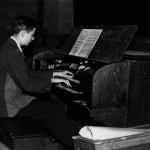 At
age five, Peter’s parents enrolled him in piano lessons, and sent him,
along with his siblings, to Sunday School and worship at Saint James
Episcopal Church in Kent, Wash. At the age of 9, Peter had his first
encounter with the numinous at Saint James; five years later, Hallock
was playing the organ there. His organ teacher at the time was Clayton
Johnson of Tacoma, Wash. Peter’s sisters Tillie and Barbara would often
trek to Saint James to hear Peter play miniature organ recitals on
Sunday afternoons; whatever Hallock was doing, his sisters were always
there. He was active and creative from an early age, not just in music,
but also arts and crafts, weaving, letter writing, puppet theater, and
soap box derby car racing.
At
age five, Peter’s parents enrolled him in piano lessons, and sent him,
along with his siblings, to Sunday School and worship at Saint James
Episcopal Church in Kent, Wash. At the age of 9, Peter had his first
encounter with the numinous at Saint James; five years later, Hallock
was playing the organ there. His organ teacher at the time was Clayton
Johnson of Tacoma, Wash. Peter’s sisters Tillie and Barbara would often
trek to Saint James to hear Peter play miniature organ recitals on
Sunday afternoons; whatever Hallock was doing, his sisters were always
there. He was active and creative from an early age, not just in music,
but also arts and crafts, weaving, letter writing, puppet theater, and
soap box derby car racing.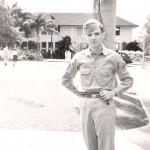 After
high school, Peter enrolled at the University of Washington (UW), but
was drafted into the U.S. Army after only one year of study. From June
1943–February 1946, he served as a chaplain’s assistant and sharpshooter
in the Pacific theater during World War II. After the war, he
re-enrolled at the UW and resumed organ performance studies with Walter
Eichinger, composition with George McKay, and took music courses with
Miriam Terry and Eva Heinitz, all of whom maintained a lifelong
collegial relationship with Peter. Though Hallock had completed all
required coursework by 1949, eighteen months of government-paid
education remained, so Peter enrolled at the College of Saint Nicolas of
the Royal School of Church Music (RSCM), then based in Canterbury,
England. He became the first American Choral Scholar at Canterbury
Cathedral, singing under the direction of Gerald Knight. In June 1951,
he completed both the RSCM program and was graduated from the UW with a
Bachelor of Arts in Music degree. Later, in 1958, he took the Master of
Arts in Music degree from the UW.
After
high school, Peter enrolled at the University of Washington (UW), but
was drafted into the U.S. Army after only one year of study. From June
1943–February 1946, he served as a chaplain’s assistant and sharpshooter
in the Pacific theater during World War II. After the war, he
re-enrolled at the UW and resumed organ performance studies with Walter
Eichinger, composition with George McKay, and took music courses with
Miriam Terry and Eva Heinitz, all of whom maintained a lifelong
collegial relationship with Peter. Though Hallock had completed all
required coursework by 1949, eighteen months of government-paid
education remained, so Peter enrolled at the College of Saint Nicolas of
the Royal School of Church Music (RSCM), then based in Canterbury,
England. He became the first American Choral Scholar at Canterbury
Cathedral, singing under the direction of Gerald Knight. In June 1951,
he completed both the RSCM program and was graduated from the UW with a
Bachelor of Arts in Music degree. Later, in 1958, he took the Master of
Arts in Music degree from the UW.Among his many contributions to local and national church music traditions are the introduction of countless audiences in the United States, and the Pacific Northwest in particular, to the countertenor voice, and founding the chant study group that eventually became known as the Compline Choir—an ensemble that has led to a resurgence of interest in the Office of Compline. He also fought successfully for installation of the Flentrop tracker-action organ at the cathedral, making Saint Mark’s the first Episcopal cathedral to have such an instrument. He developed the Advent and Good Friday Processions and introduced liturgical dramas at the cathedral. Perhaps his greatest contribution to church music was composition and publication of The Ionian Psalter.
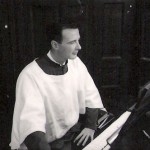 Peter
began work as organist/choirmaster at Saint Mark’s Cathedral on October
28, 1951, a position he held until his involuntary retirement in 1991.
He was named Canon Precentor, the first layperson in the Episcopal
Church to hold such a title; he received two Bishop’s Crosses from
two Bishops of Olympia, was named an Associate of the Royal School of
Church Music, and was granted a Doctor of Church Music degree honoris causa by
Church Divinity School of the Pacific. In 1992, at the invitation of
the Rev. Ralph Carskadden, Peter became organist at Saint Clement of
Rome Episcopal Church, Seattle, a position he held until March 2013.
Peter
began work as organist/choirmaster at Saint Mark’s Cathedral on October
28, 1951, a position he held until his involuntary retirement in 1991.
He was named Canon Precentor, the first layperson in the Episcopal
Church to hold such a title; he received two Bishop’s Crosses from
two Bishops of Olympia, was named an Associate of the Royal School of
Church Music, and was granted a Doctor of Church Music degree honoris causa by
Church Divinity School of the Pacific. In 1992, at the invitation of
the Rev. Ralph Carskadden, Peter became organist at Saint Clement of
Rome Episcopal Church, Seattle, a position he held until March 2013.Hallock composed over 250 works, from occasional church music to extended anthems, to dramatic works (sacred and secular), to music specifically written for the Compline Choir. To discover Hallock the mystic and composer, one need only experience his music in the “Holy Box” that is Saint Mark’s Cathedral. It is that “Holy Box” that provides both a physical space and musical landscape in which to hear, process, and intuit Hallock’s music. The texts Peter set provide vignettes of the metaphysical and mystical, from the poetry of Alcuin, to the words of the psalmist, to the poetry of Thomas Merton. Hallock married text and music in ways that allow listeners to experience something wholly unique, something beyond themselves, something numinous. Peter said it best: “Music is a conduit to the inner, spiritual person; and I think the road to God is internal.” No piece of music was immune to revision, even those already published. His most recent compositions include Advent Calendar (2012), commissioned by the Compass Rose Society to honor Archbishop Williams on the occasion of his retirement, and Victimae Paschali (2014), a work that was undergoing final revisions at the time of his death.
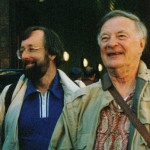 The Ionian Psalter,
Peter’s largest creative work, was born out of a desire for greater
congregational participation in Psalm singing. Hallock began composing
the Psalm settings on October 4, 1981 and continued through the entire
three-year cycle of lectionary readings. Later, he expanded the Psalter
and created a customized version for use by Lutheran congregations and
those following the Revised Common Lectionary. The Psalter’s name is
derived from Ionian Arts, Inc., the music publishing company founded in 1986 by Peter and his lifelong friend and business partner Carl Crosier.
The Ionian Psalter,
Peter’s largest creative work, was born out of a desire for greater
congregational participation in Psalm singing. Hallock began composing
the Psalm settings on October 4, 1981 and continued through the entire
three-year cycle of lectionary readings. Later, he expanded the Psalter
and created a customized version for use by Lutheran congregations and
those following the Revised Common Lectionary. The Psalter’s name is
derived from Ionian Arts, Inc., the music publishing company founded in 1986 by Peter and his lifelong friend and business partner Carl Crosier.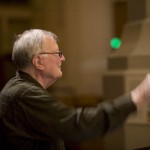 At
Peter’s invitation, twelve men from the university and community began
study of chant in 1955. This study group solidified into a choir that
sang the Office of Compline on Sundays at 9:30 p.m. beginning in late
1956. Classical 98.1 KING-FM began broadcasting the service in 1962.
Hallock once wrote of Compline: “The Compline service may find its best
definition not in terms of what it is, but what it does, for the needs
it fulfills for those who attend in person, the large radio audience,
and members of the choir. For all of these it is part of a journey
towards God. Such a journey must allow for definitions as varied as its
sojourners with the promise of a goal as ‘wide as sky and sea.’” Peter
directed the Compline Choir until his retirement in June 2009.
At
Peter’s invitation, twelve men from the university and community began
study of chant in 1955. This study group solidified into a choir that
sang the Office of Compline on Sundays at 9:30 p.m. beginning in late
1956. Classical 98.1 KING-FM began broadcasting the service in 1962.
Hallock once wrote of Compline: “The Compline service may find its best
definition not in terms of what it is, but what it does, for the needs
it fulfills for those who attend in person, the large radio audience,
and members of the choir. For all of these it is part of a journey
towards God. Such a journey must allow for definitions as varied as its
sojourners with the promise of a goal as ‘wide as sky and sea.’” Peter
directed the Compline Choir until his retirement in June 2009.As a soloist, Peter began to concertize as a countertenor in 1951, exposing audiences to that unique sound for the first time. The countertenor voice was so unusual in the U.S. that colleges and universities across the country soon requested performances—from the University of California, Berkeley, to the University of South Alabama. As a conductor, Peter’s most memorable conducting might be his first performance of Handel’s Messiah using period or replicas of period instruments in 1985. This period style performance was a first for Seattle; concerts sold out and critics raved.
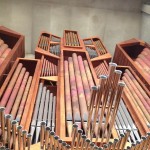 As
an organist, Peter’s lasting legacy at the cathedral is the
mechanical-action organ built by the Dutch firm D. A. Flentrop.
Installation of the organ began in late 1964 and tonal finishing took
place in July 1965. For the dedication, Peter composed Hail Universal Lord.
Hallock believed installation of the Flentrop to be one of his greatest
accomplishments: “I suppose the Flentrop might be my greatest
accomplishment, provided we don’t blow ourselves off the earth, it’ll
probably be there for a century or two.”
As
an organist, Peter’s lasting legacy at the cathedral is the
mechanical-action organ built by the Dutch firm D. A. Flentrop.
Installation of the organ began in late 1964 and tonal finishing took
place in July 1965. For the dedication, Peter composed Hail Universal Lord.
Hallock believed installation of the Flentrop to be one of his greatest
accomplishments: “I suppose the Flentrop might be my greatest
accomplishment, provided we don’t blow ourselves off the earth, it’ll
probably be there for a century or two.”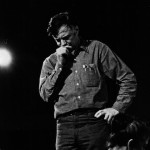 As
a liturgist, Peter contributed something new to the Advent and Good
Friday Processions held at the cathedral. He composed music for two
choirs in dialogue (Cathedral and Compline Choirs), liturgical handbells
from the firm Petit and Fritsen based in Aarle-Rixtel, Holland, and
organ. Hallock’s ultimate metamorphosis of the Advent Procession was in
crafting the liturgy around the seven ‘Great O Antiphons’ and
the setting each of the antiphons to music, using all the pomp and drama
he could muster. As a dramatist, Peter produced liturgical dramas at
the Summer School of Church Music held at Saint Mark’s in 1965. Hallock
was assisted by Ronald Arnatt (music director), Aurora Valentinetti
(dramatic director), and Glenn White (sound engineer). This production
team, minus Arnatt, collaborated on future productions in 1968, 1969,
and 1975 for Hallock’s Everyman and 1970, 1971, and 1974 for his Days of Herod.
As
a liturgist, Peter contributed something new to the Advent and Good
Friday Processions held at the cathedral. He composed music for two
choirs in dialogue (Cathedral and Compline Choirs), liturgical handbells
from the firm Petit and Fritsen based in Aarle-Rixtel, Holland, and
organ. Hallock’s ultimate metamorphosis of the Advent Procession was in
crafting the liturgy around the seven ‘Great O Antiphons’ and
the setting each of the antiphons to music, using all the pomp and drama
he could muster. As a dramatist, Peter produced liturgical dramas at
the Summer School of Church Music held at Saint Mark’s in 1965. Hallock
was assisted by Ronald Arnatt (music director), Aurora Valentinetti
(dramatic director), and Glenn White (sound engineer). This production
team, minus Arnatt, collaborated on future productions in 1968, 1969,
and 1975 for Hallock’s Everyman and 1970, 1971, and 1974 for his Days of Herod.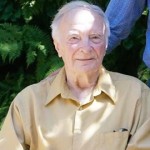 Hallock
worked extensively within The Episcopal Church, having been appointed
to the Joint Commission on Church Music in 1965; he also directed the
choir for the 1967 General Convention of the Episcopal Church. His work
with the Joint Commission on Church Music centered primarily on
production of the 1973 Songs for Liturgy and More Hymns and Spiritual Songs. Embedded within Songs for Liturgy was
the introduction of new, intriguing sounds, like handbells, percussion,
and clapping and antiphonal congregational texts, into the worship
space.
Hallock
worked extensively within The Episcopal Church, having been appointed
to the Joint Commission on Church Music in 1965; he also directed the
choir for the 1967 General Convention of the Episcopal Church. His work
with the Joint Commission on Church Music centered primarily on
production of the 1973 Songs for Liturgy and More Hymns and Spiritual Songs. Embedded within Songs for Liturgy was
the introduction of new, intriguing sounds, like handbells, percussion,
and clapping and antiphonal congregational texts, into the worship
space.Though Hallock’s music, creativity, innovations, and contributions to church music are notable, his greatest legacy is the community and family of musicians, mystics, solitaries, composers, weavers, theologians, humanists, agnostics, acousticians, “sound nuts”, chefs, gardeners, nature lovers, and lovers of beautiful things with whom Peter cultivated lifelong friendships. Whether meeting him in the office, organ loft, or his home, following his direction in a rehearsal or performance, sharing a martini over lunch or dinner, exchanging letters or emails, weaving with him at the loom, hiking or walking with him along a nature trail, digging in the dirt with him in his Japanese garden, or collaborating with him on a recording or video project, it was the friendship that mattered most.
A memorial service will be held Sunday, May 18, 2014 at 5 p.m. at Saint Mark’s Cathedral, 1245 Tenth Ave E, Seattle. Contributions in Peter’s memory can be made to one of two 501(c)(3) designated charities; please note “Hallock Legacy” on your gift:
- The Compline Choir
1245 Tenth Ave E • Seattle, WA 98102 - The Cathedral Foundation of the Diocese of Olympia
1551 Tenth Ave E • Seattle, WA 98102
and second director of the Compline Choir (4 May 2014)


No comments:
Post a Comment